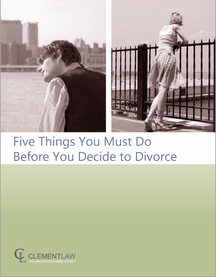The Clash2 asked the musical question: “Should I stay or should I go?”

In the divorce context, the question often is, “Should I move from the marital residence or do I tough it out and stay?”
In his article Should You Move Out Of The Marital Home? Learn From Divorce Attorneys, Not The Tabloids, Jeff Landers question why on reality tv shows, the “stars” stay in their marital homes while going through divorce. While cohabitating divorcing spouses may make for dramatic television, it may be legally unnecessary.
The old justification for not leaving the marital residence was that it could be construed as an abandonment, under New York’s old fault based divorce law. Though marital fault was unrelated to equitable distribution, the fear was that by leaving the marital home, the spouse remaining in the home would somehow acquire superior right to the marital home.
Since New York became a no-fault divorce state, the abandonment is wholly irrelevant. Moreover, assuming that the marital home was property subject to equitable distribution, it would be distributed without regard to who was living in it.
As the reality shows prove, continuing to cohabitate during the divorce creates not only drama, but tension. I am always fearful the increased tension between two disagreeing spouses living in close quarters unnecessarily creates a potentially incendiary situation, i.e., the risk of a domestic violence or an unfounded 911 call.
Since there is no economic advantage to remaining under the same roof, after deciding to divorce, there is no reason to remain living in such an uncomfortable situation – unless, of course, if child custody is in issue, then other factors and laws need be considered.


